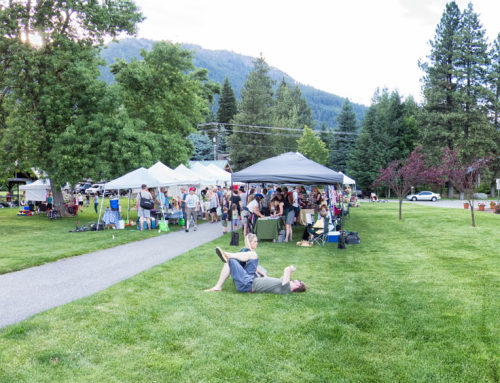Article written by Icicle TV contributor and firefighter, Alex Roberts, who is currently on the front lines battling the Okanogan Complex Fire.
Knocking on doors and telling people that they must leave immediately is one of the hardest duties of a Wildland Firefighter. We tell them that we will do everything that we can. However, the uncertainty of whether anything of their home will remain upon their return is visibly painful. With much of our region on fire and inundated by smoke, it is the responsibility of all of us to be prepared.

Here are a few things you can do to help us out, and help assure that your home will be standing upon your return. Most of these should be done ahead of time, not when the fire is at your back door. If evacuation orders are issued for your area, please do not wait for one of us to be knocking on your door before you leave.
 Create a “go-bag” for your family with clothing and other essentials to last you a few days. Explore options of where you can stay. The Red Cross sets up emergency shelters for folks to stay.
Create a “go-bag” for your family with clothing and other essentials to last you a few days. Explore options of where you can stay. The Red Cross sets up emergency shelters for folks to stay.- Get a bin for your “irreplaceables,” like photo albums, so that you may quickly grab them on the way out.
- There are several good websites with emergency information including InciWeb.
- Trim back branches that may be over hanging or very close to your house. Cut back weeds and grasses. Remove piles of yard waste. Rake up pine needles and other debris, especially from the bases of trees. Remove debris from gutters.
- Stop using “beauty bark” for landscaping. This stuff loves to burn and keeps fire hidden within, sometimes for days.
- Remove trash from around your home.
- Arrange sprinklers around your home and turn them on before you leave. Turn on irrigation, not only will this keep the fire from burning your field or orchard, it also gives us a “safety zone.” We will try to turn them off when the danger is over. Also, living grass is less likely to burn.
- Cut back old growth sage and other bushes around your property. The oils in these plants that give them their fragrance also creates large flames to help the fire spread.
- Move gas powered engines like vehicles, lawn mowers, ATVs, snowmobiles, chainsaws etc. away from your home.
- Turn off your propane tanks and natural gas valves. Move portable ones away from your home.
- Store firewood away from your home.
- If you have already vacated, a note on your door will save us time so that we may assist your neighbors.
- Store flammables like motor oil in out-buildings if possible.
- We are always stoked to see metal roofs. There are also emergency “roof-sprinklers” available for purchase.
- Keep some gas in your car. Long lines at gas stations hamper communities from effectively evacuating. Also, please drive responsibly when leaving. Auto accidents will severely diminish our ability to respond, and your neighbors’ ability to leave.
- Anything you can do to open access to your property will allow us to more effectively defend it. Open gates and do not block your driveway.
- Mark dangers around your home like open wells or anything unstable like a weak roof. Sometimes we arrive at night and may not be aware of such hazards.
- If your house is not visible from the main road, if you have a long driveway for instance, please leave a sign at the main road with any additional information including distance or if the road is particularly narrow or not maintained. This will inform which is the most appropriate engine to send.
- Have a plan to remove pets and livestock ahead of time. Writing your contact info on their hooves with a paint pen will help them get to back home if they escape.
- Find a community organization like the Red Cross to volunteer with.
The lessons of the Sleepy Hollow Fire and other fires have taught us that we all must be prepared. You do not need to live in the woods or on the periphery of town to be vulnerable. Long range “spotting” (when flying flaming debris like embers ignites fires away from the main fire) can strike homes and buildings on the interior of our communities.
There is no greater thrill for us than serving our communities. By following these steps, you will help ensure everyone’s safety, and keep your home in one piece. Thank you all for your effort and support.




